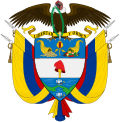Colombia–Japan relations
This article relies largely or entirely on a single source. (January 2010) |
 | |
Colombia |
Japan |
|---|---|
Colombia-Japan relations refers to the diplomatic relations between the South American Republic of Colombia and the Asian nation of Japan. The relationship was officially established in 1908, only interrupted between 1942 and 1954 with the surge of World War II. Relations are mostly based on commercial trade that has favored Japan interests, cultural exchanges and technological and philanthropic aid to Colombia.[1]
History
Diplomatic relations between Colombia and Japan were established in a treaty called Friendship, Commerce and Navigation signed in the Washington DC, United States on May 25, 1908. However, the first official embassy was set up by Japan in Bogotá, Colombia in 1934 and the following year Colombia established its embassy in Tokyo.
World War II
During the Second World War the two countries interrupted their diplomatic relations in January 1942. After the attack on Pearl Harbor, Colombia broke diplomatic relations with the Axis powers. Colombia provided the Allies with petroleum products. Then, in 1943, the German submarine U 505 destroyed a Colombian schooner, which caused Colombia to declare a "status of belligerency" against Germany on November 26. The German ambassador left the country, and measures of control were implemented, including internment of German citizens in designated areas. Photographs and reconnaissance airplanes belonging to the Colombian-German company Scadta, who used to take aerial shots of Colombian and German cities were also handed to the United States. During the recovery years, Colombia sent Nestle products (coffee, baby food, etc.) and coal for heating all over Europe.
Colombia-Japan relations did not resume until 1954. Missions were reopened in both countries in November 1954 and 1955, but didn't regain embassy status until 1957.
Commerce
According to the Colombian embassy in Japan, commercial ties between the two countries are increasingly dynamic. In 1996 Japan became the third focus of Colombian imports after the United States and Venezuela with some US$722.5 million dollars (5.6% of total Colombian imports). Japan on the other hand imported some US$ 348.6 million dollars (less than %1 of Japanese imports).[2]
Japanese products exported to Colombia are mostly assembled vehicles, auto parts, video cameras and communication devices, while Colombian products exported to Japan were mostly coffee grains and nickel, and in a minor scale emeralds, exotic reptile skins and chocolate. Most recently flowers and skin leather products.[3]
The relative low commercial exchange is due to Japan's geo-strategic interests in other Latin American countries such as Brazil (were it has an important number of established immigrants), Mexico, Chile, Peru and Argentina. For Colombian producers in the other hand exporting results highly expensive to send more products to Japan when other nearby countries represent more cost-efficient markets and have less economic restrictions.[4]
See also
References
- ^ Template:Es icon Colombian embassy in Japan
- ^ Template:Es icon Colombian embassy in Japan - statistics
- ^ Template:Es icon Colombian embassy in Japan - statistics
- ^ Template:Es icon Colombian embassy in Japan - statistics


